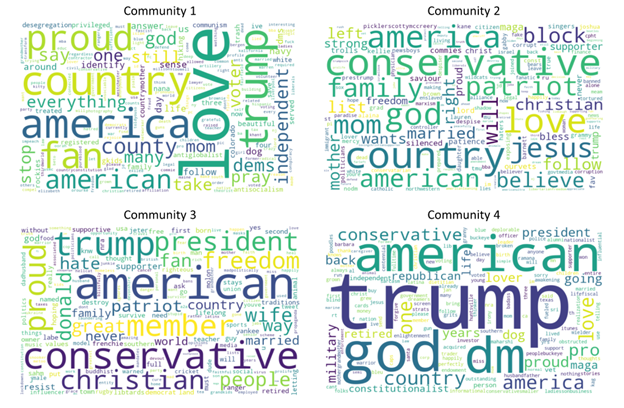How Climate Disinformation Spreads: Twitter
Boston University Climate Disinformation Initiative
Research Theme | How climate disinformation spreads through social media sites: Twitter
Research goal: To build a catalog of prominent narratives of disinformation about climate change circulating on Twitter and Reddit; to identify major accounts promoting disinformation and the networks of which they are a part; to model shifting patterns of climate disinformation around key events during 2022-2023.
Dis- and misinformation about climate change have been created and spread on Twitter, a social media platform on which accounts follow others and engage in posts across diverse topics.
The Boston University Climate Disinformation Initiative is focusing on the following three sources to identify dis- and misinformation about climate change and accounts creating and consuming them on Twitter.
Source 1: Organizations funded by ExxonMobil
ExxonMobil, a big oil and gas company, falsely reported risks of global warming, though its scientists correctly forecasted climate change1. However, interestingly on Twitter, it seems that ExxonMobil does not make any false statements. There is still a possibility that ExxonMobil indirectly spreads dis- and misinformation about climate change through funding to other entities. The research team analyzed tweets of 50 organizations funded by ExxonMobil and clustered tweets after converting texts into numeric vectors. It captured two clusters requiring further investigation. These clusters’ main narratives are “Climate change is not threatening” and “Biden’s energy plan hurts economic growth”. The Heartland Institute and the Institute for Energy Research are major contributors.

View poster on Climate Change Narratives of Organizations Funded by ExxonMobil displayed at the Taking on Climate Lies symposium in May 2023.
Source 2: Community Notes
Community Notes is Twitter’s collaborative fact-checking approach. Twitter users can sign up for this system and then write notes to tweets suspected of having dis- and misinformation and rate notes with labels, such as helpful, somewhat helpful, and not helpful. Notes and ratings are publicly available on its site. About 0.6% of tweets checked by Community Notes are about climate change and 11% of them contain dis- and misinformation (from the data on October 23, 2022). The research team collected information about retweeters of these dis- and misinformation tweets to find retweeters’ common characteristics. Several communities of retweeters were extracted from followerships. These communities seem to use right-wing keywords, including “conservative”, “freedom”, and “god”, in the account profile section.

Source 3: Contrarian claims about climate change
Coan et al. (2021) developed a list of claims about climate change commonly used by conservative think tanks and contrarian blogs2. The research team hypothesized that tweets similar to these contrarian claims are likely to contain dis- and misinformation. To test it, researchers first collected tweets having keywords used in claims. Note that these tweets do not necessarily contain contrarian claims because keywords can be combined in different ways. Keywords used in the claim “climate impacts are not bad – only a few degrees” appear most frequently in tweets. Next, we calculated similarities between claims and the collected tweets. Students in two sections of BU Metropolitan College were invited to label tweets highly similar to claims as misinformation or correct information. Over 30% of the selected tweets were labeled as misinformation, suggesting that this approach scales up dis- and misinformation searches.


View poster on Assessing the Veracity of Climate Change Information on Twitter displayed at the Taking on Climate Lies symposium in May 2023.
Research Theme Champions
-

Hyunuk Kim
Assistant Professor, Department of Administrative Sciences, Metropolitan College
-

Gianluca Stringhini
Assistant Professor, Department of Electrical and Computer Engineering, College of Engineering
-

Irena Vodenska
Affiliated Faculty, IGS;
Professor of Finance, Director of Finance Programs, and Chair of Administrative Sciences, Metropolitan College
References
- Supran, G., Rahmstorf, S., & Oreskes, N. (2023). Assessing ExxonMobil’s global warming projections. Science, 379(6628), eabk0063.
- Coan, T. G., Boussalis, C., Cook, J., & Nanko, M. O. (2021). Computer-assisted classification of contrarian claims about climate change. Scientific Reports, 11(1), Article 1.